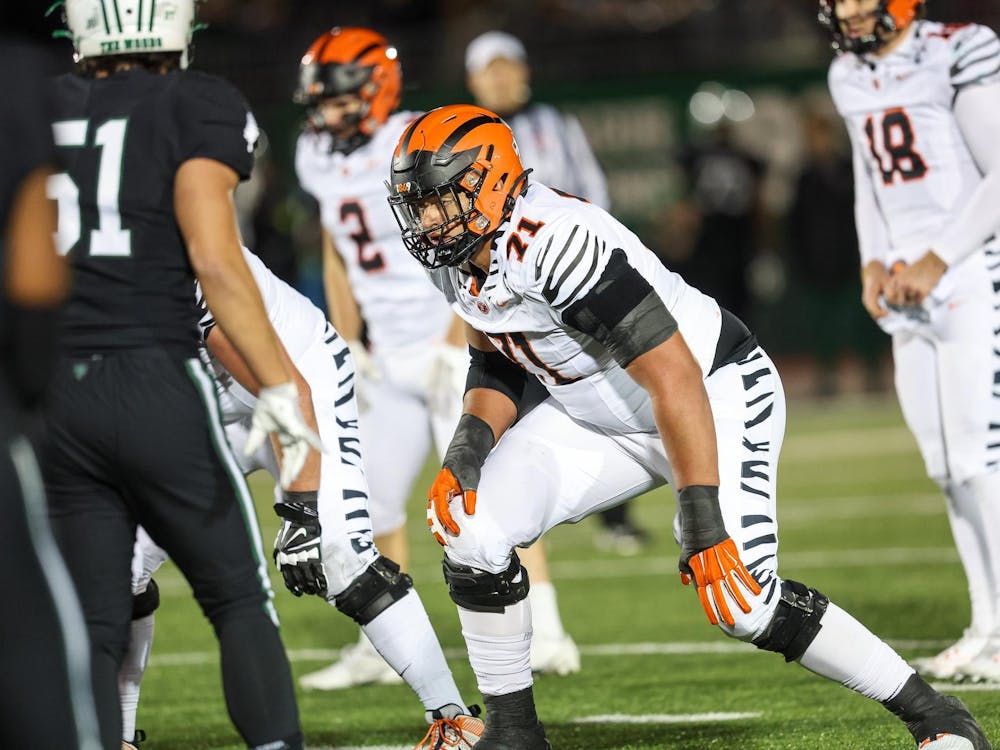Or were there?
If you just watched the first half and then left Bethlehem, you would not have been surprised. Frankly, if you were a Princeton fan, you would have been embarrassed.
But of course, you would have left after the first half. Football is played for 60 minutes for a reason, and on Saturday, the Tigers reminded us exactly why we play four quarters on the gridiron. And if you had stayed for the entire game, you may actually have been surprised, especially after watching the first half.
First, and most obviously, is the score line. At halftime, the Mountain Hawks led 17-0, a score that could have been worse if not for solid play from the special teams unit. But Princeton roared back, and at the end, it was only a three point game as the Tigers scored 14 unanswered points in the fourth quarter. Princeton was not able to pull out the win - several of the same woes that plagued the Tigers in the first half returned to haunt them during the last couple of series - but it was an encouraging effort.
Before we go on, we should recognize what kept Princeton in the game in the first half: the special teams unit, which took advantage of a muffed punt from Lehigh return man Jason Suggs, which junior fullback Dan Freund recovered. While the offense squandered that opportunity (the Tigers went for it on fourth down, not even getting a field goal), the special teams continued to keep the Mountain Hawks from blowing open the game. Senior punter Joe Cloud was essential to the effort, with four punts dropping inside Lehigh's red zone. Special teams continued to contribute well into the fourth - Princeton's second touchdown was set up by another muffed punt recovery, this time by sophomore tailback Jon Esposito.
Now, the question is just how did the Orange and Black mount its comeback in the second half? Other things aside, two things stood out - the defensive front seven and the offensive running game.
While the front seven was certainly active during the first half, the defensive pressure ramped up in the second half. The Mountain Hawks, with a comfortable lead, started to run the ball much more in the second half, presumably in an effort to burn clock. The run defense clamped down, coming up with several big stops on third down. The pass defense was notably improved in the second half as well. Despite Lehigh passing the ball much less, the front seven was able to get up in the face of Mountain Hawks quarterback Michael Colvin, including a notable incomplete pass on third down that was blocked at the line of scrimmage by senior defensive lineman Caraun Reid. However, credit must also be given to the secondary. Princeton did not give up as many big passing plays as in the first half.
On the other side of the ball, the run game was crucial in the Tigers' comeback attempt. Princeton had only 21 rushing yards in the first half, compared to 76 in the second half. More importantly, the Tigers' rushers came up big when it counted. Facing third and one on the Lehigh 34-yard line and the possibility of another offensive drive stalling, senior tailback Akil Sharp turned it on, with a 15-yard run, a 6-yard run and a 13-yard touchdown run that broke several tackles. Sharp also capped Princeton's other touchdown drive with a 1-yard run. Sophomore quarterback Connor Michelsen got the passing game going as well, demonstrating the Tigers' newfound passing ability with a successful two-point conversion pass to junior receiver Roman Wilson, but it was the run game that was Princeton's star in the second half. Even the offense's penchant for running reverses paid off. While last season - and the first half - saw reverses sometimes end in spectacular losses of yardage, Princeton gained 23 yards on a reverse to Wilson.
So, what did we learn? Sure, the Tigers gave us hope with their second half performance. But some caution, along with the optimism, is also warranted. The Mountain Hawks did hurt themselves with two turnovers and eight penalties, which went for 66 yards. Moreover, one must remember that Princeton has acquitted itself well in losses to Lehigh over the past two years - a 35-22 loss in Bethlehem in 2010 and a 34-22 loss at home in 2011 - before going on to finish 1-9 on the season. However, this loss was much closer than those, and if a relatively young team can take that second half on Saturday and build upon it, the Tigers' outlook may not be as bleak as previously thought.








